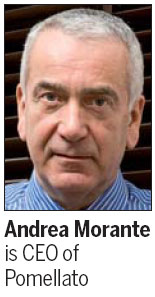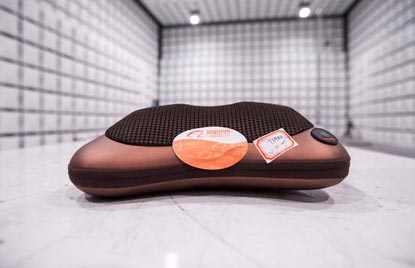Ritzy, not glitzy
By Xu Junqian (China Daily) Updated: 2012-11-23 16:42Italian jewelry house seeks sophisticated market in China
Despite what Marilyn Monroe sang and millions would have you believe, diamonds are not a girl's best friend, a conference of women leaders was told in Shanghai recently.
Sure, they can be beautiful to look at, can shine and be a bit blue at times, but there's nothing special or unusual about them and all this coming from the head of one of Europe's top jewelry houses.
|
 British actress Tilda Swinton is the "face" of Pomellato. [Photo/China Daily] |
Andrea Morante, CEO of Pomellato, said in his keynote speech to the Women in Leadership Forum China in September that the diamond-less, non-glitzy approach was the one his company took when it formed 45 years ago and still pursues today when designing and selling jewelry.
It is also a philosophy and strategy that is especially significant when it comes to competing in the new luxury market of China.
Pomellato is credited with introducing pret-a-porter jewelry when it was founded in 1967 by Pino Rabolini, whose family still holds the majority share in the company. To take on and outshine the established diamond-studded likes of Cartier and Tiffany, it innovated jewelry for everyday wear and not just for formal occasions, without compromising quality, exclusivity and cost.
Now, Pomellato is the fifth-largest jeweler in Europe based on sales, with the Financial Times describing it as "Italy's best-kept secret".
|
 |
Morante, a former investment banker who moved into the luxury industry in the 1990s following his involvement in a Gucci acquisition and restructuring case, puts Pomellato's success to looking at everything from a woman's perspective.
Female customers account for about 75 percent of sales.
"We made the decision that women are our customers," he says. "Although we know that men are very important, and we know that men are very important buyers of jewelry for their lovers. For their lovers, they are huge buyers."
Morante took charge of the Milan-based company in 2009, when the global financial crisis wiped millions of euros off jewelry sales, putting some houses into debt.
That year, Pomellato grossed 100 million euros ($127.6 million) of sales with a percentage profit of up to 16 percent. It is expected it will end 2012 with sales up to 151 million euros, with a 9.7 percent year-on-year growth.
In China, Pomellato is still a new name on the scene, the company only opening its first store less than two years ago in Beijing, and although growth has slowed here in the industry, Morante says the outlook is "extremely promising".
It has since opened another store in Shanghai and a point of sale in Hangzhou.
He acknowledges that, like most luxury companies, the main strategy is to increase presence by gradually opening more stores. At what rate, will "depend on the response from customers and the evolution of the market".
- Online infringements cost $13.8b a year
- Working under the scorching sun
- China suspends oil price adjustment
- Hong Kong stocks plunge over uncertainty of Britain's referendum
- China says ready to help India address its nuclear energy needs
- ADB loan will finance sewage treatment
- Venue of 2016 Summer Davos Forum
- Chinese stocks down on Brexit fears

















